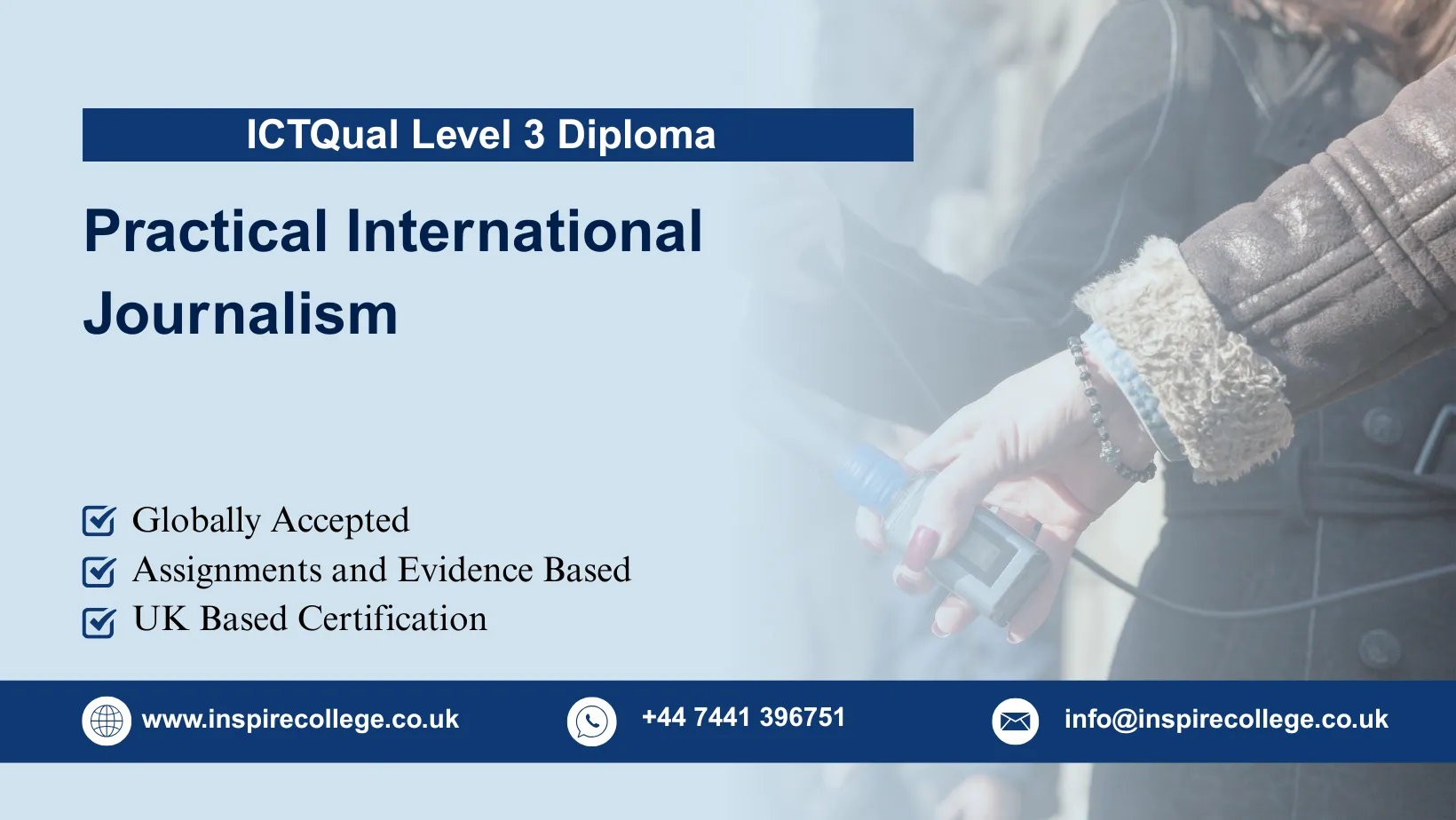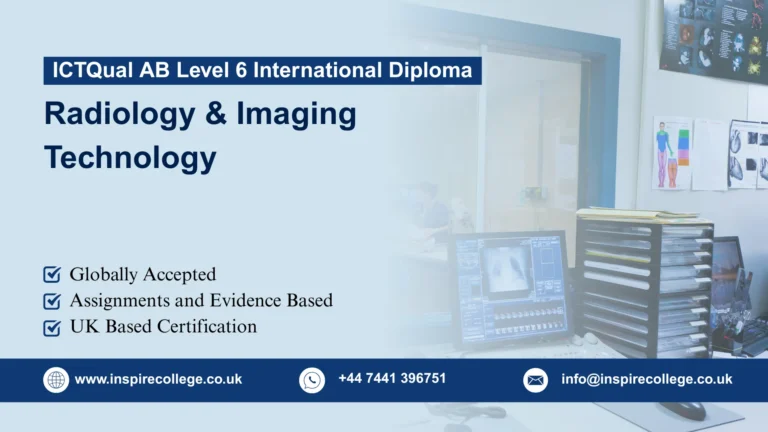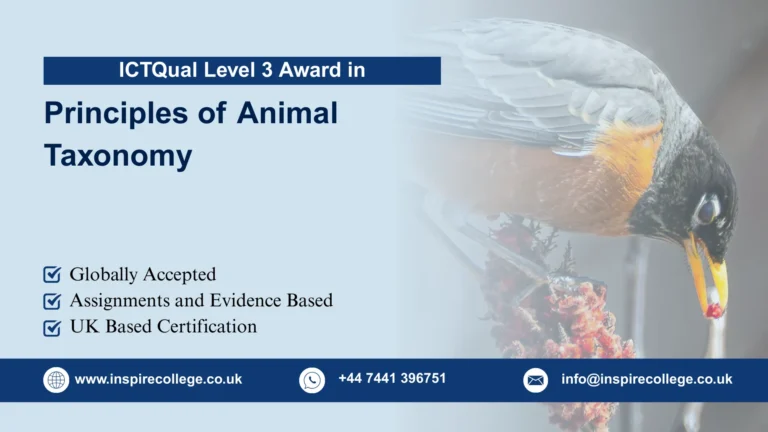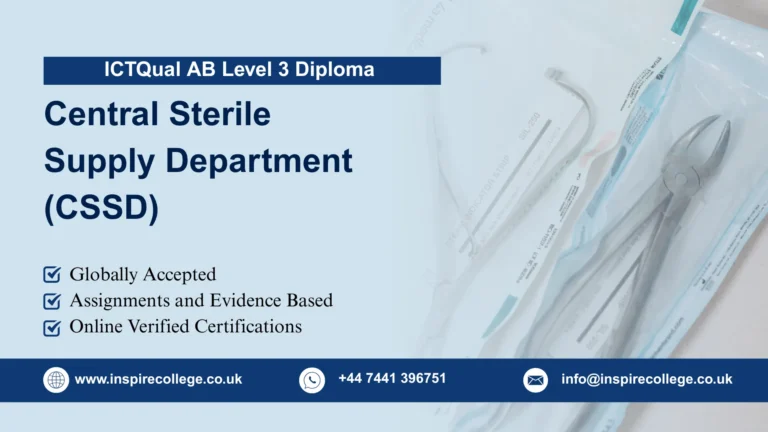
ICTQual Level 6 Diploma in Practical International Journalism
The ICTQual Level 6 Diploma in Practical International Journalism is an advanced, internationally recognised qualification designed for learners aiming to excel in professional journalism, media production, and communication leadership. This programme provides the analytical, strategic, and practical skills required to succeed in senior editorial roles and navigate complex media environments across the globe.
Learners engage in advanced reporting, investigative journalism, multimedia production, and strategic editorial practices, gaining hands-on experience in print, digital, and broadcast media. The course emphasises global perspectives, ethical decision-making, and professional standards, equipping learners to work confidently within international media regulations, diverse cultural contexts, and rapidly evolving digital technologies.
Through structured assignments, research projects, and portfolio development, learners enhance their journalistic judgement, critical thinking, and leadership abilities. They also develop expertise in data analysis, multimedia storytelling, and public affairs communication, enabling them to create accurate, engaging, and impactful content for a wide range of audiences.
Graduates of this programme are prepared for senior-level roles such as editorial strategist, investigative journalist, digital content manager, media consultant, or senior correspondent. The qualification also supports freelance, entrepreneurial, and global career opportunities, fostering professional adaptability and long-term growth in a dynamic media landscape.
The ICTQual Level 6 Diploma in Practical International Journalism is ideal for motivated learners committed to achieving excellence in journalism. By combining industry relevance, practical skills, and professional insight, this programme empowers participants to make a meaningful impact in global media while advancing their careers at an international level.
To ensure learners can fully benefit from the programme, the following entry requirements apply:
- Age Requirement:
Learners should be 18 years or older at the time of enrolment. - Educational Background:
Applicants are expected to hold a Level 5 qualification or equivalent, such as a foundation or diploma in journalism, media, communication, or a related field. Learners with substantial professional experience in journalism or media may also be considered on a case-by-case basis. - Work Experience:
While not strictly mandatory, relevant work experience in journalism, media production, content creation, or communication roles is highly recommended. This experience helps learners engage more effectively with advanced topics and practical assignments. - English Language Proficiency:
As the programme is delivered in English, learners must demonstrate strong English communication skills. This can be evidenced by:
- A Level 2 or higher English qualification, or
- Proven experience working or studying in an English-speaking professional environment.
These entry requirements ensure that learners are well-prepared to tackle advanced journalism concepts, practical projects, and international media challenges, making the programme accessible yet rigorous for aspiring senior journalists and media professionals.
Mandatory Units
This qualification, the ICTQual Level 6 Diploma in Practical International Journalism, consists of 6 mandatory units.
- Editorial Strategy, Newsroom Management, and Leadership
- Advanced Investigative Journalism and Data Analysis
- International Media Law, Ethics, and Policy Frameworks
- Multimedia Production, Digital Innovation, and Emerging Media
- Strategic Reporting, Public Affairs, and Policy Communication
- Professional Journalism Practice, Portfolio Development, and Industry Engagement
Learning Outcomes for the ICTQual Level 6 Diploma in Practical International Journalism:
Editorial Strategy, Newsroom Management, and Leadership
- Develop and implement comprehensive editorial strategies aligned with organisational objectives.
- Lead and manage newsroom teams effectively, ensuring productivity and high-quality output.
- Apply decision-making and leadership skills to balance news value, ethics, and public interest.
- Coordinate content planning, workflow management, and deadline adherence across platforms.
- Evaluate audience insights and analytics to refine editorial strategies and engagement.
- Foster innovation, collaboration, and professional standards within editorial teams.
- Manage resources, including personnel, digital tools, and publication budgets.
- Promote accountability, transparency, and inclusivity in newsroom operations.
Advanced Investigative Journalism and Data Analysis
- Conduct complex investigative research using advanced reporting techniques.
- Analyse data sets to identify trends, patterns, and actionable insights for stories.
- Apply verification and fact-checking methods to ensure accuracy and credibility.
- Develop in-depth investigative reports suitable for print, broadcast, and digital media.
- Protect sources and handle sensitive information ethically and responsibly.
- Integrate statistical and qualitative data into compelling news narratives.
- Manage investigative projects, timelines, and associated legal risks.
- Communicate investigative findings effectively to target audiences.
International Media Law, Ethics, and Policy Frameworks
- Interpret international media laws, regulations, and policy frameworks.
- Apply ethical principles to ensure impartiality, fairness, and accountability in reporting.
- Analyse the balance between freedom of expression and public interest globally.
- Recognise copyright, defamation, privacy, and intellectual property considerations.
- Develop editorial guidelines that comply with legal and ethical standards.
- Evaluate ethical dilemmas and regulatory challenges in international journalism.
- Understand the impact of misinformation, bias, and censorship on global media.
- Promote transparency, responsibility, and professionalism in media practice.
Multimedia Production, Digital Innovation, and Emerging Media
- Create high-quality multimedia content using video, audio, and graphics.
- Integrate innovative technologies such as AI, AR/VR, and data visualisation in journalism.
- Optimise content for digital, social, and mobile platforms to enhance reach and engagement.
- Apply storytelling principles across multiple media formats.
- Manage multimedia production workflows from concept to publication.
- Evaluate the effectiveness of digital content using analytics and audience feedback.
- Adapt multimedia strategies to emerging trends and technologies.
- Develop creative solutions for engaging international and diverse audiences.
Strategic Reporting, Public Affairs, and Policy Communication
- Analyse political, economic, and social issues for accurate and impactful reporting.
- Communicate public affairs and policy matters clearly to diverse audiences.
- Build professional relationships with stakeholders, institutions, and organisations.
- Investigate and report on government, international, and civic developments.
- Apply ethical and legal considerations when reporting on sensitive public affairs.
- Develop media campaigns to inform, educate, or influence audiences responsibly.
- Conduct in-depth analysis for strategic and policy-oriented journalism.
- Evaluate the role of journalism in shaping public opinion and accountability.
Professional Journalism Practice, Portfolio Development, and Industry Engagement
- Demonstrate professional conduct, ethical awareness, and editorial standards in all work.
- Develop a comprehensive portfolio showcasing a wide range of journalistic skills and outputs.
- Engage with media organisations and professionals through projects, placements, or networking.
- Apply critical thinking, research, and project management to professional journalism tasks.
- Reflect on personal development to enhance professional growth and career readiness.
- Adapt to emerging technologies, global trends, and industry demands.
- Plan and manage journalistic projects from inception to publication.
- Exhibit leadership, creativity, and strategic insight in media practice and professional engagement.
The ICTQual Level 6 Diploma in Practical International Journalism is designed for learners who are ready to advance their careers in journalism, media, and communication at a professional and international level. This programme is ideal for individuals who want to gain a deeper understanding of strategic journalism, editorial leadership, and multimedia production, and who aspire to take on senior roles in the media industry.
This course is particularly suitable for:
- Aspiring Senior Journalists and Editors – Professionals who want to move into senior newsroom roles, editorial strategy, or leadership positions, refining their skills in investigative reporting, multimedia storytelling, and content management.
- Media and Communication Professionals – Individuals already working in media, PR, or corporate communication who wish to strengthen their journalistic expertise and broaden their understanding of international media standards and ethical practices.
- Digital Content Managers and Multimedia Specialists – Learners looking to develop advanced skills in digital reporting, multimedia production, data journalism, and online content strategy to excel in the fast-evolving digital media landscape.
- Freelance Journalists and Media Entrepreneurs – Independent writers and media entrepreneurs who want to enhance their credibility, expand their professional portfolio, and gain international recognition in the journalism field.
- Professionals Seeking Career Transition – Individuals from other industries who wish to transition into journalism or media-related roles and require an advanced qualification to demonstrate competence, professionalism, and industry readiness.
Overall, this programme is designed for motivated, ambitious, and globally minded learners who want to combine practical skills, strategic insight, and ethical journalism practices. It empowers them to lead in international media environments, create impactful content, and make significant contributions to the journalism profession worldwide.
Register Now
FAQs for ICTQual Level 6 Diploma in Practical International Journalism






